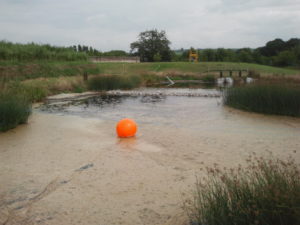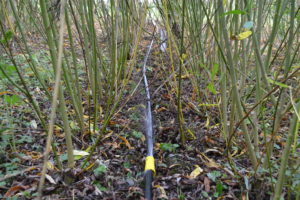Crops for Energy are partners in academic research study on using short rotation coppice for the management of landfill leachate – The BRILL project
Crops for Energy are delighted to be an industrial partner in a project called: Biomass Production through the Sustainable Recycling of Irrigated Landfill Leachate (BRILL). The research is headed up by the Agri-Food and Biosciences Institute (AFBI) and is funded by Invest Northern Ireland through the Centre for Advanced Sustainable Energy’s (CASE) core research programme. The project has five industrial partners: Resourceful Organics, River Ridge Recycling, Eastwood Envirowaste, Gurteen Agricultural College and C4E and will run until August 2018.
In simple terms landfill leachate is produced when rain falls on a landfill site and percolates through the decomposing solid waste. Landfill leachate usually includes dissolved organic matter, macro nutrients such as ammonia, chlorides and sulphates, heavy metals such as lead and copper and nasty halogenic compounds such as PCBs and dioxins. As a result landfill leachate is a cocktail of substances that are very environmentally damaging. In recent years landfill operators have been faced with tighter regulations for treatment on site and off site together with and increasing high costs and carbon footprints to manage the disposal.
In the UK as a whole there are thousands of landfill sites in various phases (operational, closed, restored and some illegal) that all have on-going leachate management needs that will continue for many decades. The cost for leachate collection, transportation and treatment at sewage treatment works amounts to 10’s if not 100’s of millions, not to mention the carbon costs!
The BRILL project will provide answers on the efficacies of how to treat landfill leachate in situ by using short rotation coppice (SRC) willow as a biofilter. This is potentially a much more economic and environmentally sound alternative to tankering to treatment works and could save landfill operators millions of pounds in management costs. The planting of SRC would also provide other benefits in terms of:
- Providing a commercial land use for landfill sites which present large areas of unused land needing remediating and active use
- Production of sustainably produced indigenous biomass for renewable heat and power production
BRILL has the following project objectives:
- To investigate and demonstrate the efficacy of new SRC willow varieties for the management and treatment of landfill leachates at both lysimeter and pilot scale
- To investigate biomass production and yields, groundwater protection, effect of rainfall, clonal variation, plant and soil behaviour, nutrient uptake and heavy metal bio-accumulation
- Aid the development of treatment management protocols and produce cost models for these natural based treatment systems at functional sites
- Evaluate the potential for renewable energy generation in terms of energy, carbon emissions (life cycle assessments – LCA) and fuel production costs
- Produce and analyse raw biomass material quality.
Results will be posted on the C4E site as they are produced. Watch this space!

